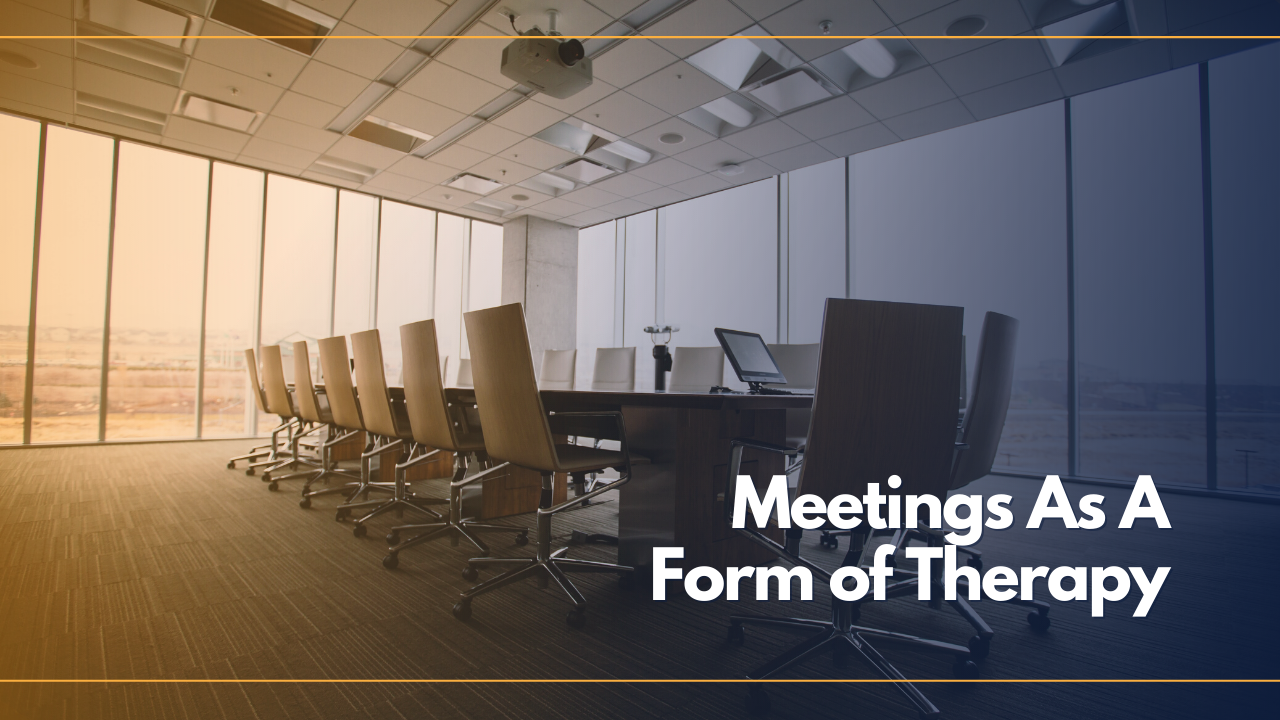- Meeting rooms are a form of therapy, according to Professor Patrik Hall from Malmö University in Sweden.
- Even if meetings are unproductive, Hall argues that they serve the purpose of helping employees feel like they are part of an organisation.
- Meetings can be improved by inviting colleagues that are on the same professional level and by making them shorter.
A meeting shouldn’t be seen as a vehicle for decision making but rather as a form of therapy, according to political scientist Professor Patrik Hall from Malmö University in Sweden. He’s been investigating why people have such a low opinion of meetings even though their frequency is increasing.
According to a 2019 survey of 1,945 employees by organisational consulting firm Korn Ferry, 51% of professionals say spending too much time in meetings and on calls distracts them from making an impact at work to “some extent”.
A further 16% say this is true to a “great extent” and overall, 67% of workers say excessive meetings prevent them from getting their best work done.
Why do we spend so much time in meetings?
The number of meetings we participate in (or endure, depending on your point of view) is on the rise, according to Hall, who has co-authored a book on the topic. He explains that it’s not uncommon for office workers to spend half their working day or more in meetings.
However, productivity levels are waning. Absenteeism and presenteeism in meetings is on the rise, and it’s not uncommon to see disengaged participants checking their phones.
The increase in the number of meetings reflects changes in the workforce, says Hall.
Relatively new professional roles like “strategist”, “project manager” and other managerial jobs lend themselves to frequent meetings, but these meetings often prove futile when it comes to decision making.
When managers “don’t know what to do” or are “unsure of their role,” they react by generating more meetings. “People like to talk and it helps them find a role,” says Hall.
Meetings are actually a form of therapy
Hall believes that ”meetings are maligned somewhat unnecessarily.”
He thinks meetings should be seen for what they are: a form of workplace therapy. In other words, an opportunity for employees to feel like they are part of an organisation, even if they don’t necessarily result in measurable outcomes.
Meetings also provide people with a necessary space for complaining.
“One either meets or one works. One cannot do both at the same time.”
– Peter Drucker, management consultant, educator, and author
“Some people find this frustrating. Why are we sitting here? Departmental meetings is an example of a meeting that many feel is pointless. Here, the meeting is intended to remind employees that they belong to an organisation,” says Hall.
How can we make meetings more productive?
Hall suggests the most productive meetings are those that have a level playing field. He notes that negative feelings towards meetings are often bought on by a sense of powerlessness.
This is less likely to happen in meetings where everyone is on a similar level.
“When you have meetings with colleagues at the same level, as a professional, you get to discuss different issues that interest you.
Meetings with individuals at higher levels in the organisation instead arouse feelings of meaninglessness. There is always a subtle power struggle against the leadership of the organisation.”
Meetings could also be improved, Hall explains, by not automatically booking one or two hour long sessions. Long scheduled meetings tend to continue until the end, even though the relevant conclusions have been reached earlier, he suggests.
“There is always a subtle power struggle against the leadership of the organisation.”
– Professor Patrik Hall
Deborah Frost, Chief Executive of Personal Group, an employee services company, believes that having clear objectives is important.
She says: “I never set foot in a meeting without a pre-agreed agenda so people are clear about the purpose of the meeting and come prepared. In meetings, I’m often challenging myself and the team on ‘what’s the outcome we’re looking for?’ and ‘does this align with the objectives we set?’.”
Others think the answer could lie in semantics.
Writing for Harvard Business Review, Al Pittampalli thinks that we should stop calling every work conversation a “meeting” and look for more appropriate alternatives.
He suggests we use more robust vocabulary to describe common meeting types.
For example:
- Meetings with two people: Conversations
- Meetings that involve generating work: Group work sessions
- Meetings that involve generating work: Brainstorms
He says: “Vague and imprecise language obscures the true purpose of these gatherings, making it difficult to know how to optimize for their success. It also makes it harder to distinguish the worthwhile ones from the worthless.”
Do you think meetings are or a therapeutic exercise or a complete waste of time?
Join the debate on Twitter @Allwork_space.

 Dr. Gleb Tsipursky – The Office Whisperer
Dr. Gleb Tsipursky – The Office Whisperer Cat Johnson – Coworking Marketing Maven
Cat Johnson – Coworking Marketing Maven Angela Howard – Culture Expert
Angela Howard – Culture Expert Drew Jones – Design & Innovation
Drew Jones – Design & Innovation Andrea Pirrotti-Dranchak – Competitive Advantage
Andrea Pirrotti-Dranchak – Competitive Advantage Jonathan Price – CRE & Flex Expert
Jonathan Price – CRE & Flex Expert Jeremy Fennema – Tech Innovation Alchemist
Jeremy Fennema – Tech Innovation Alchemist







